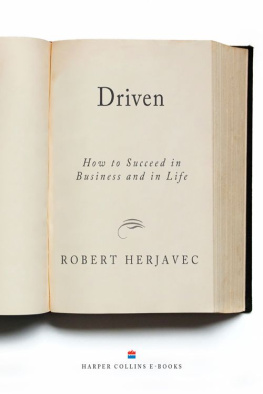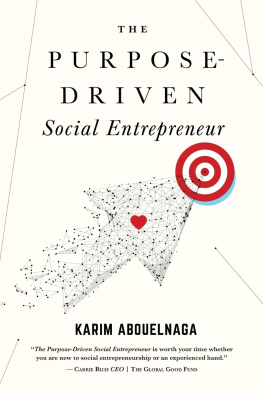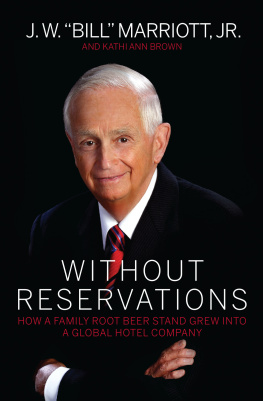For my late parents (Katica and Vladimir), without whose sacrifice I would not be here.
For my familyDiane, Brendan, Skye and Capricewhose support and love makes the journey worthwhile and joyous.
1
Know a Good Deal When You See It
The $200,000 cheque was on the table and we were ready to sign the deal.
Four bright young guys had achieved what thousands of entrepreneurs only dream of: they had obtained venture capital to transform their company from a struggling concept to a potentially major corporation, thanks to the cash that was almost in their hands and the expertise of their new partners, who happened to be all five panellists on the CBC-TV show Dragons Den. Including me.
The young men named their company JobLoft and their vision was sound: develop an Internet-based service to connect hospitality and retail-oriented companies in need of qualified people, charging a fee for the service. Instead of using newspaper advertisements or employment agencies, both of which are time-consuming and expensive, employers and prospective employees would connect through JobLoft. The founders wisely narrowed their focus to target firms with a 67-per-cent annual staff turnover, precisely the kind of companies interested in satisfying their staffing requirements quickly and often.
We liked the concept, we liked what they had achieved, we liked the prospects for growth, and we liked the four young men, all of them wearing orange ties, who brought the critical intangibles of dedication and enthusiasm to the mix. Jim Treliving, who launched and still runs Boston Pizza, and Laurence Lewin, whose La Senza chain of stores was becoming a dominant force in lingerie sales, were especially enthusiastic. Their participation alone would add a wealth of expertise in guiding the growth of JobLoft.
All five of us on Dragons Den agreed to contribute $40,000 each to the investment, buying 50 per cent of the company with the $200,000 total. Such unanimity among us is unusual, and a measure of the ventures appeal. These guys making the pitch were good, and the Dragons were enthusiastic. Sounded like a win-win deal all around. So what happened?
Before the Dragons were to meet, sign the contracts and present them with the cheque, the young men decided to invite their silent partnerwho happened to be their former business-school professorto the ceremony. I suppose they wanted to share the glory of the moment with the person who, they believed, provided them with the inspiration for their business.
When the JobLoft partners arrived for the videotaped event, we didnt know what to make of the middle-aged man accompanying them. He wasnt dressed in the style you might expect for a serious business meeting. His worn leather jacket, open sport shirt and sandals hardly fit the mood, but we werent going to stand on ceremony, and when he was introduced as their professor we acknowledged his presence and got started.
For the first few minutes, the professor stood aside, watching and listening with an expression that suggested he was suffering from indigestion. Finally, as I finished reviewing the deal with the young men who had pitched JobLoft to us, the professor barked an objection. I dont like the business plan, he said, and launched into a critique of the strategy we had just agreed upon.
Well, all right. A business plan deserves to be examined from every angle before implementing it, and we listened to the professors objections, most of them dealing with our proposed strategy to target employers over prospective hires. When we expressed disagreement with his concerns, the professor began questioning our academic credentials.
Do you have a business degree? he demanded.
What was his point? Is earning a business degree an assurance of success for entrepreneurs? Not really. I had successfully launched and managed companies dealing with Internet security and other computer-related aspects, but I achieved it without formal business training. Jim Trelivings early business training included experience as an RCMP officer, a career he abandoned in favour of delivering pizza orders from his car, which also served from time to time as his office and bedroom. From that start, he built a billion-dollar corporation. How many business-school graduates can make the same claim?
As though emboldened by our lack of academic credentials, the professor grew more strident in his objections, and began insisting that the Internet search engine that would connect the job openings and the job seekers be designed to his specifications.
Jim, who had mentioned earlier in the meeting that he had flown to the meeting on his private jet, interrupted the professors harangue to say, You know, I have no idea what youre talking about.
The professor fixed Jim with a scowl. If you spent more time dealing with business instead of flying around on your jet, he sneered, maybe you would know the answer.
I couldnt believe the mans arrogance. Excuse me? I asked, assuming he would express his point in a more polite manner.
He swung to face me. You heard me, he snapped. You guys should feel lucky youre making this investment in the company. Then he added: Lets be honest. Its only $200,000, and thats not a lot of money to any of us.
You know, I replied as I reached for the cheque, maybe the problem is that I can still remember when $200,000 was all the money in the world. I held the cheque in the air for everyone to see. Then I tore it up and dropped the pieces on the table. If its such a small amount of money, I suggested to the professor, why dont you put it in?
As you can imagine, this distressed the young men who, a few moments earlier, had anticipated using the cash to expand their business. Now the cheque lay scattered like confetti on the floor, and access to industry contacts and experienced support that would have been available to them through Jim, me and the other Dragons had vanished.
I took no pleasure in tearing up the cheque. Like every other investment I made, I had planned to earn a profit from my share. But I felt two lessons had to be learned in this situation. Lesson One: you dont bite the hand that feeds you. Venture capital is simply too difficult to obtain, especially when its accompanied by a sincere interest in helping entrepreneurs succeed. Lesson Two: Do not assume that every business idea you have is worth a million dollars on its own. Because it is not. Life is more complex than that. In addition, do not believe that academic training, as valuable as it might be in the right context, is more valuable than practical experience, especially when it involves launching, building and managing a business.
I felt for the young men who watched the investment money vanish after they had worked hard to acquire it. They had demonstrated the qualities that all successful entrepreneurs possess, including vision, determination and sufficient energy to make their concept a reality. What they also had, and didnt need, was a so-called silent partner who couldnt remain silent and keep his outlandish criticism and arrogant attitude to himself. Academics such as their professor may be good at delivering theory, but theory itself has no value, and using it as a weapon to shoot down practical experience is unacceptable. If the professor was going to influence the value and potential return of our investment, either he or our investment had to go. He appeared to be a permanent fixture. Our cash wasnt. So it was gone.










